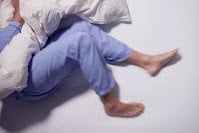APA’s Good Faith Estimates Survey: Please Respond Today The No Surprises Act requires clinicians to...
Mirtazapine and Vitamin B6 May Be Best Options for Antipsychotic-Induced Akathisia
| APA’s Good Faith Estimates Survey: Please Respond Today |

Akathisia—a feeling of restlessness that is often accompanied by movements like rocking or pacing—is a common side effect of antipsychotic medications. A meta-analysis published in JAMA Network Open suggests that biperiden, mirtazapine, and vitamin B6 are the three most effective treatment options for antipsychotic-induced akathisia.
Cyril Gerolymos, M.D., of Aix-Marseille Université in Marseille, France, and colleagues compiled data from 15 randomized clinical trials testing potential pharmacotherapies for akathisia in people taking antipsychotics. The combined data included 492 patients, 324 of whom received an active drug and 168 received placebo. Ten medications were evaluated: biperiden, clonazepam, cyproheptadine, mianserin, mirtazapine, propranolol, trazodone, valproate, vitamin B6, and zolmitriptan.
The researchers noted that clinicians should be prudent about interpreting their results due to the small sample size, but offered the following findings:
- Six medications were found to be effective. They were the following, in decreasing order of strength: mirtazapine, biperiden, vitamin B6, mianserin, trazodone, and propranolol.
- Cyproheptadine may also be potentially effective, but there was not enough evidence to make a firm conclusion.
- Clonazepam, valproate, and zolmitriptan did not show effectiveness and are not recommended.
“[M]irtazapine consistently ranked first in both the main analysis and all subgroup analyses. However, mirtazapine may be poorly tolerated due to its sedative effects and the potential for weight gain,” Gerolymos and colleagues wrote. Rather, they suggested that vitamin B6 may be the best option in terms of risk-benefit ratio, as it is very well tolerated. However, for patients with akathisia who also have depressive symptoms and insomnia, mirtazapine may be preferred.
Gerolymos and colleagues also cautioned that “trazodone should be avoided in men who have specific hematologic or neurologic diseases (such as sickle cell anemia, multiple myeloma, leukemia, hypercoagulable states, or autonomic nervous system disorders) or in men with anatomical deformations of the penis.”
(Image: Getty Images/iStock/AndreyPopov)





